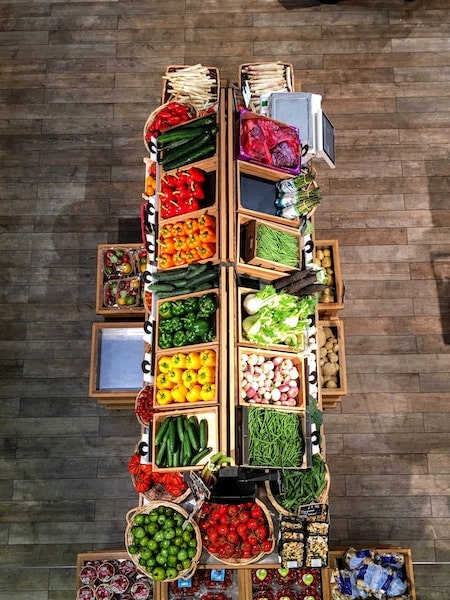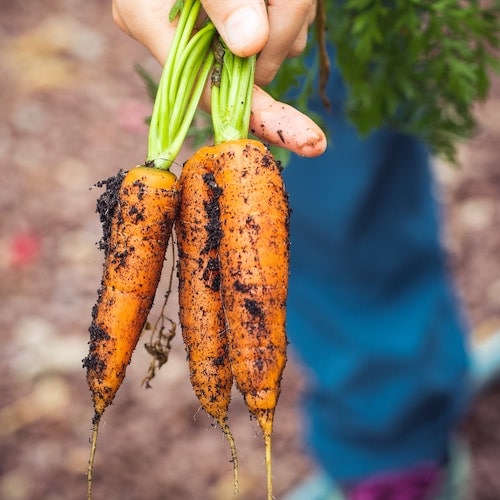This short essay addresses how trust mechanisms are articulated in one of Geneva’s local organic stores, considering the existence of trust relationships between human and non-human elements that make up the system studied: i) farmers/shopkeepers ii) consumers iii) organic labels.
According to the latest report released by Switzerland’s main organic certification agency (BioSuisse), the country currently holds the world’s largest numbers in organic consumption per resident. In the report, BioSuisse also stated an impressive growth of nearly 20% in the influx of organic products in the country in 2020. A key element enabling the growth of this agri-food system is the customers’ trust that such products have in fact been produced following strict production protocols. The main trust-building mechanism in this field are the organic labels, such as BioSuisse, which certify that the production process has been properly audited. Unlike mainstream supermarkets, local markets seem to foment, to a larger extent, a type of customer trust generated by interpersonal relationships arising from their proximity and familiarity with sellers who guarantee the organic origins of their products. In such spaces, customer trust finds more favourable ground to be based on human relations rather than solely on organic labels, in a context in which communication practices play an important role.
Local markets seem to foment a type of customer trust generated by interpersonal relationships arising from their proximity and familiarity with sellers.
Classic authors of sociology of trust such as Georg Simmel and Niklas Luhmann conceptualised trust from a functionalist perspective, showing trust as a central element for the maintenance of social order. Following this functionalist path, Anthony Giddens (1987) has shown that in modernity interpersonal trust has migrated to trust in systems. In organic agriculture, trust in the farmer migrated to trust in the auditing certification system. This migration pointed out by Giddens can also be associated with the studies of Theodore Porter (1995), who, when analysing the growth of quantitative methods, standardisation processes and the creation of impersonal objective rules, developed the concept of “mechanical objectivity”. Along these lines, Pentland (1993) showed that auditing rituals offer a sense of comfort and security, generating trust in the same functional perspective as Luhmann (2017) and reinforcing Porter’s ideas. Following the vision of standardisation and mechanical objectivity, Raynolds (2004) highlighted the central role of auditing and certification systems for the maintenance of the world trade in the organic sector. She also argues that the values of the organic movement – based on a more interpersonal trust and on interpersonal relationships – were also thriving through alternative organic retail arrangements and a growing consumer consciousness.
This conceptual dichotomy of trust (personal vs. impersonal) present in the organic market is addressed here in relation to the “Ferme de Budé”, which is a 0.7 ha urban organic farm located in the neighbourhood of Petit-Saconnex, Geneva. All production, certified by BioSuisse, is sold at their local store that attracts an average of 1000 clients per week. As the farm’s production does not meet the client demand both in terms of quantity and variety, they also sell a range of organic products with priority to local, regional, national and international products, in this order. Their motto “Priorité au local, priorité au bio” synthesises their shared values in relation to food commercialisation and consumption practices. In this sense, the Ferme de Budé presents itself as a rich environment for understanding how mechanisms of trust are articulated within the growing organic scene of Geneva.
The presence of interpersonal relationships and its link to creating consumer trust is something that stands out in this specific setting, by contrast to mainstream supermarkets that work on a rather impersonal basis in which the organic labels are usually the only trust-building element in place. Issues concerning the relationship between the farm and its clients came up in informal conversations as well as in interviews with interlocutors from both groups. For local store “collaborators” – as workers call themselves – a good portion of their clients is frequently “picky” and “rigid” in choosing what to buy. This strict demand from customers normally involves the origin of products, as most of the clients go there to purchase local organic food. When some food items are not from Geneva or Switzerland, clients usually demand explanations to the market staff as to why the Ferme de Budé opted to sell those products over local ones.
These constant demands for justification and explanations posed by the customers have led the Ferme de Budé to be extra careful when selecting products for sale. Much of the relationship of trust between clients and the Ferme de Budé store workers is built up through such dialogs involving clients’ demands. In this sense, not only are the demands and the seller’s response to them key aspects in trust-building, the communication practices in which such demands are made are also a central element for customer trust. The everyday commitment – which is constantly at stake – of the farm to commercialise high quality products makes the foundation for a relationship of trust based on interpersonal relations in which direct dialogues with clients are central. Although consumer trust is generally posed on the farm as an enterprise, it can also be seen as an interpersonal type of relationship as the few workers of the store are the main responsible for nourishing these relationships on the farm’s side, on a daily basis, with an array of clients.
The store ambience is indeed permeated by short conversations between customers and staff on available/non-available products, their specificities as well as suggestions and demands from customers. When a client comes for the first time, she/he is usually welcomed with a brief tour explaining the sections of the market and how it is also organised in terms of information concerning the origin of products. Such practices indeed contribute for a client/seller relationship that seems to be very much valued by both sides and deeply contributes to consumer trust. In this context, communication practices are the foundation element for interpersonal trust-building between organic consumers and sellers.

Luhmann’s (2017) point regarding familiarity being a precondition for trust was seen in dialogues with the Ferme de Budé’s workers but mainly in interviews conducted with clients. The relationship they have had with store collaborators seem to be an important factor for their trust on the quality of the products sold at the market. As interviews explored the issue between trust in labels and interpersonal trust, answers from regular customers expressing their trust on the Ferme de Budé and their collaborators were unanimous. For example, when asked if the Ferme de Budé’s products did not have a certified organic label they would still buy them believing they are organic if the farm informed the clients so, all answers were “yes”. Furthermore, most respondents spontaneously raised the issue of trust – even though the word trust itself was not mentioned in the question. In what follows, I quote a few answers from different customers: (Consumer 1) Yes, because for me it’s a matter of trust. I trust them, so yes”; (Consumer 2) “Probably yes. I trust them because we have a relationship with them. Even if the lady at the cashier of COOP [a large Swiss supermarket chain] knows me too, here we do exchange [and at COOP we do not]”; (Consumer 3) “Yes, well, I’ve bought food several times here and it’s usually very good, it has a good taste, so I trust this farm”; (Consumer 4) Yes, I would. I’m not saying the label is not important, it’s just about confidence”; (Consumer 5) “Yes, I trust them […] there should be more places like this”. These excerpts reveal the importance of clients’ “relationship” and “exchange” with the Ferme de Budé collaborators in their sense of “trust” and “confidence” on the sellers – and consequently on the organic products sold at the farm’s store.
Overall, customers interviewed did not seem to place a great importance on organic labels with respect to the products produced by the Ferme de Budé, stating that they trust the farm and know that no pesticides are used in their agricultural production. However, from the perspective of the Ferme de Budé, the organic labels – especially BioSuisse – seem to be important especially for customers who are not local residents and frequent clients (and therefore do not know the way the farm works, their values, etc.). As only local consumers – with whom stronger relationships of trust are built – would not allow for the economic sustainability of the Ferme de Budé’s store, labels also play an important role in generating consumer trust. Thence, a dual trust-generating mechanism is observed, forming a scenario in which one seems to strengthen the other considering the different types of clients involved. Consumer trust is, therefore, on the one hand, anchored in specific interpersonal relationships between sellers and regular customers and, on the other, fully delegated to organic labels to generate trust especially within the group of non-regular and non-local clients who are less familiar with the farm’s workers and their shared values on agriculture and food affairs. In this sense, the “exchanges” and “relationships” established through continuous communication practices with regular customers generate a kind of trust which considerably differs to the audit-based semiotic practice and function of organic labels. As far as Ferme de Budé is concerned, both mechanisms of trust are complementary and mutually important for the financial sustainability of the store.
The “exchanges” and “relationships” established through continuous communication practices with regular customers generate a kind of trust which considerably differs to the audit-based semiotic practice and function of organic labels.
According to an interlocutor who has been closely involved in the BioSuisse organic certification processes of the farm in the past years, the only viable way to discontinue their organic certification would be the implementation of structures of Community Support Agriculture (CSA), which would guarantee an anticipated sale of all production and whose proximity to clients would potentially nullify the necessity for organic labels. This person, however, does not see this happening with the Ferme de Budé, as for her the farm is embedded in a different commercial context.
This “different commercial context” in which organic labels are necessary were indeed common perceptions during the short fieldwork conducted for this study, reinforcing the view that both types of trust are important for the sustainability of the local business. Ferme de Budé interlocutors believe that the BioSuisse organic label goes beyond a label placed on a fruit or vegetable to generate consumer trust. Although this factor is certainly important, it is strategic for Ferme de Budé to belong to the “BioSuisse network”, as it brings local businesses the prestige of the BioSuisse brand. In addition to acquiring varied materials for the commercialisation of BioSuisse products that are useful to the local store, the Ferme de Budé also gains the opportunity to have a closer contact with other BioSuisse producers of the region that are relevant for their local network of partners.
This short essay briefly discussed, in the context of a local organic store and urban farm located close to Geneva’s city centre, the articulation of mechanisms of trust based on systems or mechanical objectivity (organic labels) and on more subjective elements anchored in interpersonal relationships and familiarity. In the Ferme de Budé, the two trust-generating mechanisms identified function in an integrated manner, assuming different objectives to keep the business going – not only in relation to financial stability but also to the values of the farm’s “collaborators”. The organic labels, most of all BioSuisse, have an importance to the farm that goes beyond the sole certification of organic products to generate trust in clients, as this renowned national label integrates the farm in a system of other organic farms that is beneficial to the Ferme de Budé as an enterprise. Although they hold values that connect them to a more grassroots organic movement, they still find themselves embedded (and acknowledge its importance) in a network of mainstream national organic agriculture. Nevertheless, much of the trust by clients on their products does not rely much on the organic labels per se, as it is built, to a great extent, on the relationship of proximity they have developed with the farm and its store collaborators that differs substantially from mainstream supermarket chains.
Bibliography
Giddens, Anthony, 1987. Social theory and modern sociology. Cambridge: Polity Press.
Luhmann, Niklas, 2017. Trust and power. Malden, MA: Polity Press.
Pentland, Brian T. 1993. Getting comfortable with the numbers: Auditing and the micro-production of macro-order. Accounting, Organizations and Society 18 (7-8):605-20.
Porter, Theodore M. 1995. Trust in numbers: the pursuit of objectivity in science and public life. Princeton, N.J.: Princeton University Press.
Raynolds, Laura. 2004. The Globalization of Organic Agro-Food Networks. World Development 32 (5): 725–743.
Featured image by Markus Spiske on Unsplash.





